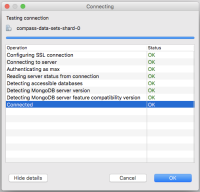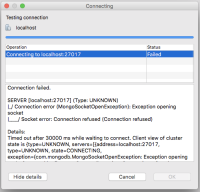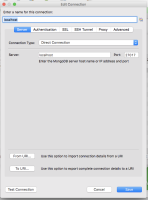-
Type:
Task
-
Resolution: Won't Fix
-
Priority:
Major - P3
-
None
-
Affects Version/s: None
-
Component/s: Connectivity
-
None
User Story
"As a Compass user with commercial support, I want to easily copy and paste diagnostic info when a connection fails so that I can include it in the SFSC I open enabling faster resolution from MongoDB Support"
Summary
> Note @lucas: Updated with complete context per COMPASS-2848
When customers are having problems connecting via Compass we can now provide a much better experience than instructing customers to enable debugging and open the devtools console (see CS-32525).
Gathering Diagnostic Data
mongodb-connection-model@5.0.0 added a new `status` event. These status events are propagated via mongodb-data-service. Status events are emitted while establishing a connection for each step in the process. Each step has an underlying with a human-readable message property and one property pending||error||complete||skipped.
The implementation of these steps/checks can be found in mongodb-connection-model/lib/connect.js (line 170 at time of this writing).
Steps Explained
The possible values for a status event message are:
- Validate Validate the user input against mongodb-connection-model's business logic
- Load SSL files Checks that the SSL files specified by the user are readable (if specified)
- Create SSH Tunnel Checks that SSH Tunnel can be successfully created and written to (if specified)
- Connect to MongoDB Given all of the above, can we connect to MongoDB using the node.js driver?
- List Databases Inactive. See below.
Example Usage
test: function(done) {
var onTested = function(err) {
if (err) {
metrics.error(err);
return done(err);
}
debug('test worked!');
done(null, this);
}.bind(this);
var diagnosticMessages = [];
var dataService = new DataService(this);
debug('Testing connection to `%j`...', this.serialize());
dataService.on('status', (evt) => {
/**
* Example status events:
*
* >>> { message: 'Validate', pending: true }
* >>> { message: 'Validate', complete: true }
* >>> { message: 'Load SSL files', pending: true }
* >>> { message: 'Load SSL files', skipped: true, reason: 'The selected SSL mode does not need to load any files.' }
* >>> { message: 'Create SSH Tunnel', pending: true }
* >>> { message: 'Create SSH Tunnel', complete: true}
* >>> { message: 'Connect to MongoDB', pending: true }
* >>> { message: 'Connect to MongoDB', complete: true }
* >>> { message: 'Connect to MongoDB', error: MongoError('Invalid or missing certificate', stack: 'Error: self signed certificate in certificate chain...') }
*/
// TODO Write these as nice messages to populate the diagnostic info
});
dataService.connect(onTested);
return this;
}
List Databases
This is currently commented out in mongodb-connection-model and here is the primary reason: it's tricky to actually listDatabases(). The actual command requires the authenticated mongodb user to have escalated privileges. However, there is a workaround detailed in mongodb-data-service/lib/instance-detail-helper.js.
This workaround leverages the server's connectionStatus and userInfo commands. It's complicated but very possible to list collections and databases without having underlying escalated privs. See the implementation in mongodb-data-service/lib/instance-detail-helper.js starting at roughly line 283.
This underlying complexity would be mitigated by PM-544 (see comments there for more details).
UX
In the Compass connect window, when a connection fails, add a link to show "Diagnostic Info" which toggles textarea containing status event messages. Under the textarea, include a "copy diagnostic info" button which writes the contents of the textarea to the clipboard using electron's clipboard API.
—
Prior Art
RoboMongo

See Robomongo RC8 blog post for more details.
While in the area as this will be at least a minor release, please also refactor to split up the ssh-connection-options which appear to be unnecessarily coupled together as discovered on COMPASS-396:
const opts = { // TODO: Would be nice to split this into connectOptions (passed to .connect()), // TODO: ... forwardOutOptions (i.e. srcAddr, dstPort, dstAddr) and // TODO: ... startLocalSSHServerOptions (e.g. localPort, localAddr) readyTimeout: 5000, forwardTimeout: 5000, keepaliveInterval: 5000, srcAddr: '127.0.0.1', // OS should figure out an ephemeral srcPort dstPort: 27000, // final mongod port dstAddr: '10.0.0.131', // final mongod IP localPort: 29000, // TODO: Choose this ephemeral port randomly localAddr: '127.0.0.1', host: '35.163.143.252', // Jump box IP port: 22, username: 'ec2-user' };
- related to
-
COMPASS-3280 Connection Diagnostics
-
- Closed
-




